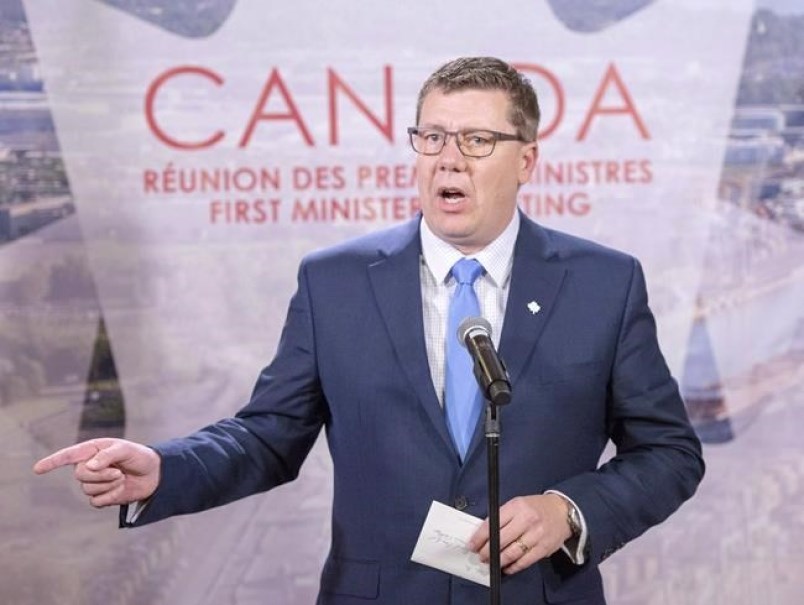REGINA — Lawyers are expected to pack a Regina courtroom today to argue the constitutionality of a federally imposed carbon tax.
A panel of five judges is to listen to arguments from both the Saskatchewan and federal governments as well as from 16 interveners on both sides of the dispute.
Saskatchewan opposes the federal government's plan to force a carbon tax on the province and plans to argue it is unconstitutional because it's not applied evenly in all jurisdictions.
Ottawa says the constitution gives it the power to impose a carbon price because climate change and greenhouse gas emissions are national concerns.
The two-day hearing is to open with Saskatchewan presenting its case followed by submissions from other carbon-tax opponents.
The governments of New Brunswick, Ontario and Alberta's Opposition United Conservative Party are among the presenters.
On Thursday, Ottawa is to get its turn as well as interveners from the pro-carbon-tax side.
"I would put this case on a short list of important federalism decisions that courts have grappled with," said University of Alberta law professor Eric Adams.
He said there are merits to both arguments.
Where Saskatchewan will want to keep the court focused on the federal-provincial division of powers, Ottawa is likely to steer its argument towards the issue of climate change itself, Adams said.
Saskatchewan Attorney General Don Morgan has said challenging the constitutionality of Ottawa's carbon tax is the right thing to do for his province's residents and its energy sector.
Saskatchewan is one of four provinces without a carbon pricing plan that will be subject to Ottawa's fuel charge starting in April.
New Brunswick, Ontario and Manitoba are the others.
The federal government's carbon price starts at a minimum at $20 a tonne and rises $10 each year until 2022.
Here's a look at some of the 16 interveners and their arguments:
Indigenous groups
Alberta's Athabasca Chipewyan First Nation says a federal carbon tax is constitutionally necessary because climate change has an impact on the treaty rights of northern Indigenous peoples. The Assembly of First Nations says regulating carbon emissions is a national concern and Ottawa is "constitutionally bound" to mitigate the effects of climate change for First Nations people and their territories.
Attorney generals of Ontario and New Brunswick
They argue the federal government is upsetting the balance of power between Ottawa and the provinces. They believe the federal government doesn't meet the criteria needed to act under the authority of a "national concern" by imposing a carbon tax.
United Conservative Party of Alberta
Alberta's official Opposition says if the court agrees with Ottawa that greenhouse gas emissions are a national concern, the federal government's jurisdiction will expand and leave Alberta unable to develop its own programs.
Attorney general of British Columbia
The province already charges a carbon price. B.C. argues it already suffers from the effects of climate change and the province's industries could be at a competitive disadvantage without a national carbon price. It says its cement industry has already been affected.
Canada's Ecofiscal Commission and the David Suzuki Foundation
They say reducing carbon emissions are a national concern that requires immediate action. "If it is not a matter of national concern, it is difficult to imagine what kind of transboundary pollution problem ever would be," says a factum filed by the commission.
Environmentalists
A coalition of environmental groups cites international commitments made by Canada to cut emissions. It also argues Ottawa's actions are constitutional because Canada is obliged to uphold the "right to life, liberty and security of the person" under the Charter of Rights and Freedoms.
Canadian Taxpayers Federation
The non-profit group advocates for low taxes and says a carbon tax is ineffective at reducing emissions, threatens energy affordability and violates the principle of "no taxation without representation."
Agricultural Producers Association of Saskatchewan
The group's president says farmers will be unable to recoup the costs created by a carbon tax. Todd Lewis says the provincial government better recognizes the efforts farmers have already made to reduce their carbon footprint.
SaskPower and SaskEnergy
The Crown corporations say carbon pricing will make their operations more expensive and those costs will be passed on to consumers. Both believe a federally imposed carbon tax attempts to regulate them.



